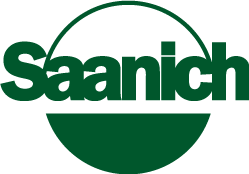The District of Saanich lies within the territories of the lək̓ʷəŋən peoples represented by the Songhees and Esquimalt Nations and the W̱SÁNEĆ peoples represented by the Tsartlip, Pauquachin, Tsawout, Tseycum and Malahat Nations. The First Peoples have been here since time immemorial and their history in this area is long and rich.
The District of Saanich is proud that our name is derived from the W̱SÁNEĆ peoples. Saanich Council is committed to taking a leadership role in the process of healing wounds of the past and becoming a more just, fair and caring society.
Pathway to Truth and Reconciliation
On November 27, 2017, Saanich Council received a staff report outlining the findings of the Truth and Reconciliation Commission’s Call to Action and passed a motion to commence formal government-to-government relationships with the District of Saanich’s neighbouring First Nation governments: Songhees, Esquimalt, W̱JOȽEȽP (Tsartlip), BOḰEĆEN (Pauquachin), SȾÁUTW̱ (Tsawout), W̱SIḴEM (Tseycum) and MÁLEXEȽ (Malahat). Staff were given authority to implement projects and initiatives that improve government-to-government relationships within our existing budget.
W̱SÁNEĆ Leadership Council and District of Saanich sign ÁTOL,NEUEL MOU
On December 3, 2021 the W̱SÁNEĆ Leadership Council (WLC) and the District of Saanich formalized their commitment to reconciliation and are pursuing opportunities for collaboration with the signing of an ÁTOL,NEUEL (“Respecting One Another”) Memorandum of Understanding (MOU).
Building from the rich dialogue that arose through the Cordova Bay local area planning process, the MOU outlines key areas of interest and priority for the W̱SÁNEĆ Leadership Council and Saanich within the following themes:
- Recognition of W̱SÁNEĆ rights, history, and culture;
- Governance and implementation of MOU;
- Environmental concerns;
- Protection of ancestral sites;
- Public art and education projects;
- Economic development opportunities, including housing; and
- Parks management.
In addition, priorities identified by the WLC include Saanich Recognition of Douglas Treaty Rights and Oral History of the Douglas Treaties and the United Nations Declaration on the Rights of Indigenous Peoples. Saanich Council and staff will work toward these outcomes through dialogue and education.
For the full media release and the MOU links are on the right.
Victoria Urban Reconciliation Dialogue Gathering
Saanich Community Services staff were honoured to participate in this event by both attending the two day conference and by sitting on the steering committee. It is through events like these that we are able to stay engaged with the urban reconciliation conversation. We look forward to future opportunities to learn and are proud to present the Victoria Urban Reconciliation Dialogue February 28-29 Gathering Report.
The report provides a summary of the 2020 Victoria Urban Reconciliation Dialogue (VURD) Gathering (the Gathering) held on February 28-29 on the traditional territory of the W̱SÁNEĆ peoples, in Victoria, British Columbia (B.C.). VURD is a network of partners interested in advancing reconciliation with Indigenous peoples in the area of Victoria, British Columbia, Canada. The VURD Steering Committee is a collaboration of urban Indigenous organizations, including the Victoria Native Friendship Centre (VNFC) and Métis Nation of Greater Victoria; three levels of non-Indigenous government (federal, provincial and municipal); and urban Indigenous community members.
The 2020 Gathering was the third gathering hosted by VURD and brought forward the findings of the previous two events to seek community feedback and support for VURD’s next steps. The Gathering brought together over 150 people from the Métis Nation, all levels of non-Indigenous governments, the urban Indigenous community, local First Nations, and community-based social service agencies and non-profits including health, the justice and education sectors, financial institutions and arts organizations.
Download the full report here.
First Nations interdepartmental working group
Council’s motion of November 27, 2017 included direction to create a staff First Nations interdepartmental working group. The working group was asked to report back to Council on their assessment of the June 2015 Truth and Reconciliation Commission’s “Calls to Action” Report with potential initiatives for the District of Saanich to explore.
The Staff report September 21, 2018 included the following initial actions:
- Cultural safety and humility training for Council and staff
- Building formal government-to-government relationships
- Presenting a more “welcoming face” by creating a First Nations Relations web page, and installing welcome signage at all Saanich recreation facilities in SENĆOŦEN and Lək̓ʷəŋən languages.
Council endorsed these recommendations on October 1, 2018.
In the 2019 Budget, Council approved an annual budget of $10,000 for initiatives and programs identified by the interdepartmental working group and approved by Council.
Going forward
Reconciliation is more than a ceremonial acknowledgement of our territories. It is an opportunity to learn the true history of this area, and acknowledge the unjust treatment of the people whose lands we occupy.
The process forward will take patience as we take a hard look at our colonial past and work toward decolonization and reconciliation with the W̱SÁNEĆ, Lək̓ʷəŋən, and Urban Indigenous.
The District of Saanich acknowledges the support provided by the Capital Regional District First Nations Relations division.

